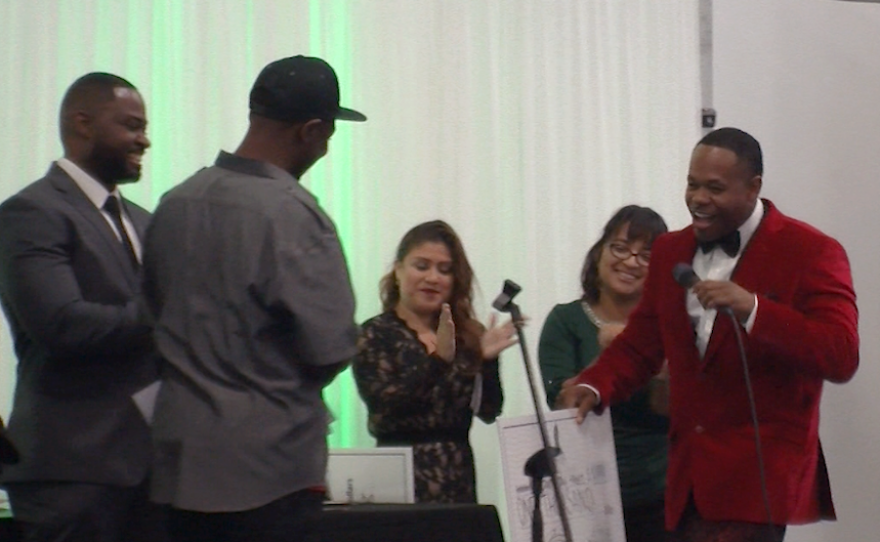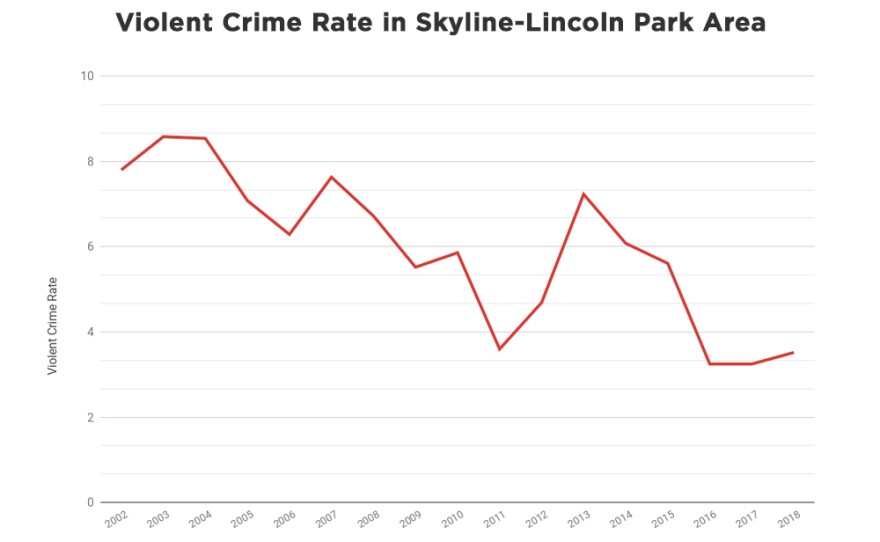This is a special six-part series called Dr J's. A new story will be published every day.
On a Friday night late last year, a big group was gathered in the auditorium at the Jackie Robinson YMCA in Chollas View. Well-known people were there — Assemblywoman Shirley Weber, newly-elected Councilwoman Monica Montgomery and Tony Gwynn Jr., the son of the Padres legend. Catering staff were passing around trays of appetizers and almost everyone was dressed up.
That includes Armand King, who always looks sharp. Even if he's just wearing a T-shirt, he'll have on sneakers in exactly the same color. That night he was wearing a red tuxedo jacket and black and red shiny pants.
He was stressed out. It was his event, a graduation ceremony for his nonprofit Paving Great Futures, and everyone had questions for him: when should we open the doors, why isn't the music working, where are the pens?
But he seemed to relax as he took the stage to talk about his programs, which work with students at lower income schools and train people in culinary skills.
"Ultimately, we all have the same goal, and that's to save lives," he told the audience. "There's some people out here that are being neglected, not recognized, and oftentimes shunned. So use us ... not use, I hate the word use, let's change it, another U word, utilize us to get to the people that need the help the most."
One by one, people who completed his training classes went to the stage to get a diploma. But when one particular young man was called up, King hopped back up to use the microphone.
"We're hijacking the stage real quick, I hope you don't mind," he said. "This gentleman right here is exactly what we're trying to do. This guy alone has probably stopped more gang feuds and unnecessary homicides than will ever come out there on the news."
He reached out and touched the back of the man, who looked startled at the sudden attention.

"Although you'll never see him on the news, you'll never see him get recognition in the mainstream, that's why we're here to give him recognition," King continued. "And we also got something for this guy right here. He had no idea he was going to get this big fat check!"
King pulled out one of those giant novelty checks. It was written out for $1,000 to Muslah Abdul-Hafeez.
The price of police presence
I met Abdul-Hafeez a few months ago at a recreation center in Encanto. He was living in the neighborhood when the two women were shot outside Dr J's Liquor and remembers it well.
"When God let that happen to those old ladies, it shined a light on Southeast San Diego. What's going on out here? Why are all these shootings happening? And no one is going to jail because the police don't care," he said.
Abdul-Hafeez said after the shootings, it was different, and not in a good way.
"Man it was like, you know how in Ferguson they were rolling around in tanks, big military trucks, they were rolling around here like that," he said, referring to the protests in Ferguson, Missouri. "It was operation 'Shut Down Skyline;' it was a war against the community of Skyline."
There weren't actually tanks in the street, but policing did change in the area.
Soon after the shooting, San Diego Police Chief William Lansdowne added a new team of eight patrol officers to the Southeastern Division and made sure the department's gang units spent more time there.
San Diego Police Lt. Manny Del Toro worked for many years in the Southeastern Division and said he has heard the criticism before that after a shooting like the one at Dr J's, there were too many police officers and too many arrests.
"Let's say we're investigating a gang crime, and the particular suspect is believed to be from one of the gang areas," he said. "I'm very open and honest with (residents) that yeah, that area is going to be flooded with officers who are looking for witnesses, looking for other potential victims and looking for some type of cooperation."
Police rely on lots of arrests because that can be the only way they get to talk to anyone, he said.
"We don't get a lot of cooperation in gang cases so it forces us to at times take extra enforcement action in a particular area," he said.
But Del Toro also said that for every person who's complaining about over-policing, there's also someone who's complaining the police don't do enough.
"I ask them to put themselves in the shoes of the community member, who's a good kid, was a victim, who was really an innocent bystander," he said. "Don't we owe it to that person who would maybe say that there's under-policing, that we don't care enough to put a lot of effort into it?"
And that's what happened after the Dr J's shooting. Some people saw it as flooding the streets with officers arresting everybody. Others actually became more willing to work with police.
Black Men United
That includes Abdur-Rahim Hameed, the founder of the Black Contractors Association in San Diego.
After the shooting, "I was in tears," he said. "And I said, 'We've got to do something. This is out of hand.'"
He joined up with other black leaders from the area and started a group called Black Men United.

"I put out a flier asking for information and a reward, and it says, 'Brothers don't kill brothers, and they damn sure don't kill mothers,'" he said.
Black Men United had multiple approaches. Some members went out to meet with gang leaders to ask them to call a truce and stop the violence. They worked on finding jobs for people who were in gangs and wanted out. And the group also started working with the police, which created a generational divide.
"It really to some degree turned the young people away from being close with Black Men United because they didn't want to be involved with an organization that appeared to have an alliance with law enforcement," Hameed said. "The difference was we were not there to turn them in to law enforcement, we were there taking guns out of bloody hands and getting rid of the guns and saying, 'Look youngster, this ain't going to do you no good.'"
Armand King, the snappy dresser who gave out the big check, said the generational rift about whether to work with police still exists today.
"We had a lot of elders from our community that were now reaching out to law enforcement, what they would say was please come stop the violence," he said. "That was like a green light to just come in and mash on black and brown individuals who fit the description of a gang member. Their excuse was, the community is reaching out for us to do it."
Whether people liked it or not, there was more police presence and more community cooperation.

It's hard to draw any direct correlations from this, but after the shooting, crime did start to go down. Two years later, the violent crime rate in Skyline and Lincoln Park had dipped, and in 2017, the rate was down by almost half.
Along with boosting police presence, the police chief also did something else: He started a task force to solve the murders of the two women.
But for many years, it didn't look like they were going to have any success. In a newspaper article a year after Carol Waites and Sharen Burton were killed, the pastor of their church said, "We don't have any closure. If it had happened in La Jolla, we'd have closure by now."
In our next story, we'll talk about how police eventually landed on a suspect.








